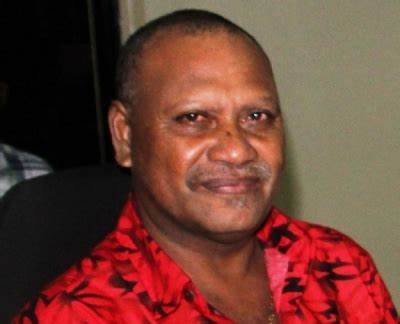Solomon Islands Premier Daniel Suidani says his province of Malaita will also push for independence if the prime minister does not stand down.
The premier of the most populous province in the Solomon Islands said the nation would likely switch formal diplomatic ties from China back to Taiwan if the prime minister is ejected by a no-confidence vote on Monday following a wave of violent anti-government protests in November.
Daniel Suidani, the leader of Malaita, said on Friday that it would be in the Pacific Island nation’s best interests to affiliate itself with Taiwan because of shared democratic values.
He has previously been vocal in his criticism of Prime Minister Manasseh Sogavare’s decision in 2019 to switch from diplomatic recognition of Taiwan to embrace formal ties with Communist-ruled China.
In a Telegraph interview, he accused the government of keeping the country in the dark over the 2019 switch, fanning resentment that national leaders were ignoring the public’s voice and raising fears that the Solomons’ democratic system could be undermined.
“People must not think that democracy is something we can take for granted,” he said. “I would like to beg people in the Solomon Islands who stand for democracy to remain strong.”
The 2019 decision sparked public unease over Chinese political influence in the strategic Pacific nation and added to the concerns of the U.S and its allies about Beijing’s expanding economic and military footprint across the Indo-Pacific region.
Last week geopolitical tensions added fuel to anti-government protests over poverty, unemployment, corruption, and unresolved inter-island rivalries, that quickly descended into riots, arson, vandalism, and the deaths of three people.
Political unrest was driving demands for independence in Malaita, Suidani said, as he warned Australia and other regional peacekeepers from New Zealand, Fiji, and Papua New Guinea not to prop up the unpopular federal government.
It is feared Monday’s no-confidence vote could break the current uneasy calm and become a flashpoint for further unrest in the nation of some 650,000.
“The bottom line is the change of government is a must,” Suidani said. “I am under quite a lot of pressure from people because of their wish to change the government.
In 2020, Suidani said Malaita, which has roughly one third of the national population, would prepare the groundwork for an independence referendum because of public anger about the decision to ditch ties with Taiwan for China.
On Friday, he said his provincial authorities this weekend would renew discussions on a legal pathway to independence in the event that Sogavare does not stand down.
“There are legal ways forward,” he said. “All of the people in Malaita, they are looking at independence as the only way to get out from the Solomons Islands, but we are very mindful of repercussions,” he cautioned.
“As a government we need to look at legal avenues. Even if they want independence, there must be a legal process that we must follow to end up with what they want but in a more appropriate way.” It is the only way forward for them to remain as a country.”
Suidani appealed for calm and for people to refrain from illegal activities, while calling for a “nationwide dialogue” with the prime minister and other provincial leaders. The central government needed to listen to public concerns, he said.
Sogavare has blamed “foreign powers” – referencing the ones “influencing Malaita” and opposed to the Solomons’ ties with Beijing – for instigating recent violence in the capital, Honiara. He did not name names in his comments to Australia’s ABC news.
Street protests in late November, calling for his resignation, descended into a frenzy of looting and arson focused on the commercial centre of Chinatown. The violence led to the arrest of more than 100 people, and an estimated $25 million in damage.
Mobs almost breached the parliament and there was an attempt to burn down Sogavare’s home, prompting him to appeal for Australian troops to be deployed under a security treaty signed with Canberra in 2017.
While foreign intervention had restored peace, it did not solve the country’s long-term underlying economic and development problems, said Suidani.
“Our belief is that the regional forces on the ground will continue to allow bad governance in the Solomon Islands. We remind the international community the arrival of the international forces, led by Australia, has only given confidence to Prime Minister Manasseh Sogavare,” he told an online press conference in Taipei.
He said the main grievance of Malaitans was the government’s failure to enforce the Townsville Peace Agreement, signed 21 years ago to resolve ethnic conflict between rival island groups with a form of self-autonomy for Malaita, and Guadalcanal province, where the capital is located.
“The reality is that the Solomon Islands today is a house built on sand, unless the promise of more autonomy and the issue of land and natural resource control and indigenous benefits are meaningfully addressed,” he said.
SOURCE: THE TELEGRAPH UK/PACNEWS














